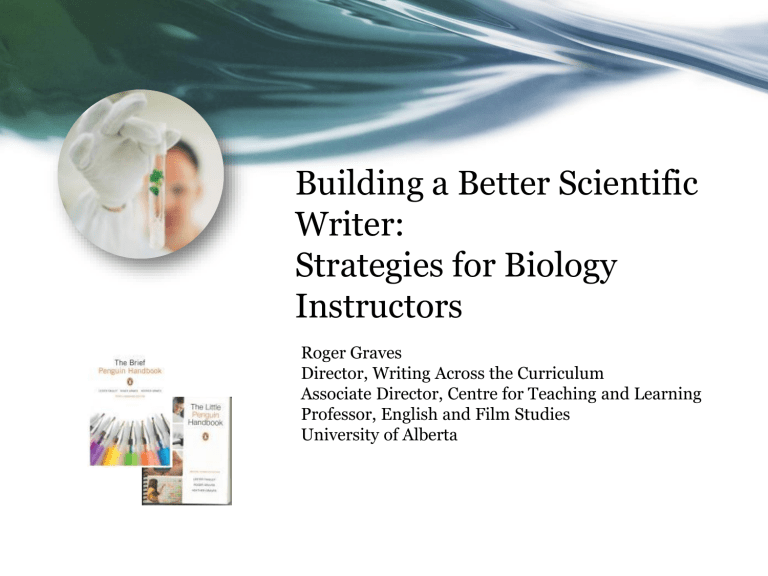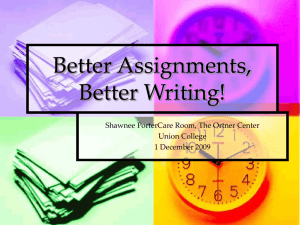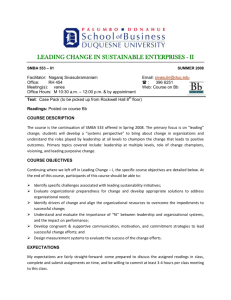Building a Better Scientific Writer

Building a Better Scientific
Writer:
Strategies for Biology
Instructors
Roger Graves
Director, Writing Across the Curriculum
Associate Director, Centre for Teaching and Learning
Professor, English and Film Studies
University of Alberta
Presentation Overview
• Why focus on writing?
Why
How
• How do students learn to write?
• What questions do I need to ask about my assignments?
My assignments
Learn more
• What resources can help me learn more?
Why focus on writing?
Students often scrutinize a course's assignments as soon as they see the syllabus
Writing skills are key outcomes for degree programs
Writing is a key method for learning about any subject
Alexander, C. (2007). Literacy Matters: A Call to Action. Toronto: TD Bank Financial Group Study.
Bloom, M. R., Burrows, M., Lafleur, B., and Squires, R. (1997). The Economic Benefit of Improving Literacy
Skills in the Workplace. Conference Board of Canada, Ottawa.
National Commission on Writing. (2004). Writing: A ticket to work. . . or a ticket out: A survey of business leaders.
Available www.collegeboard.com
Writing & the economy
The capacity to write well is among the most universal of skill sets required in the modern workforce. At the same time, preparing students for writing across the multitude of contexts and modalities they will face in the
21st century economy is extremely challenging . It is a challenge worth investing in: Numerous studies over the past decade have demonstrated that raising national literacy rates have a profound effect on the productivity of the Canadian workforce, the quality of life of individual Canadians, and the size of the Canadian economy (Bloom, Burrows, Lafleur & Squires, 1997; TD
Bank, 2007; Fisher & Engelman, 2009). TD Bank (2007) found, for example, that a “1% increase in literacy boosts productivity 2.5% and output
1.5%” (p. 14) leading to a $32 billion increase in income for each 1% increase in national literacy rates. Writing ability is an important part of that picture, defined by the National Commission on Writing (2004) as a threshold skill that factors into hiring and promotion decisions at 52% of the companies they surveyed.
Stages of student development
Non-academic writing from high school
Generalized academic writing
Novice approximations of disciplinary ways of knowledge making
Expert, insider prose
MacDonald, S. P. (2004). Professional and Academic Writing in the
Humanities and Social Sciences. Carbondale, IL: Southern Illinois
University Press.
Building a better writer
Beaufort, A. (2007). College writing and beyond: A new framework for university instruction.
Logan, UT: Utah State Press.
Writing process knowledge
Do I benefit from drafting a lot?
Do I work well with others?
Do I pay attention to my writing processes
(metacognitive awareness)?
What processes are involved in writing?
Writing process knowledge
Is writing recursive for me?
Subject matter knowledge
Do I know enough about the subject to get started
Should I combine my efforts with others
Should I learn more about this area?
Subject matter knowledge
Rhetorical knowledge
Do I have a sophisticated understanding of how to achieve my purpose in writing?
Can I write for different audiences in the same text?
Rhetorical knowledge
Genre knowledge
Have I studied the target text?
Is this the right genre for the purpose?
What are the limitations and possibilities in this text?
Recursive, iterative, social
Your teaching is like an iceberg
• most of it is under the surface
• syllabus is the 1/10 that is visible
• it appears frozen but is constantly changing and moving, responding to currents
• finished written work by students shows only a fraction of the learning they engaged in http://upload.wikimedia.org/wikipedia/commons/a/ac/Iceberg.jpg
Question 1
• What writing or text-based presentations do you ask your students to do in your class(es)?
• If you do not ask them to write or present, could you?
Question 2
• Do you assign the same or similar assignments as other instructors?
Sample biology genres
• Paper critique
• Blog assignment
• Science forum discussion
• Scientific proposal
• Monograph review
• Literature review
• Article summary
• Discussion
• Essay proposal
• Project presentation
• Lab report
• Field notebook
• Journal
• Poster
Kinds of informal writing assignments
•
•
•
•
• The reading journal
• Solving real problems
• Generic and focused summaries
Pre-test warm-ups
Annotations
• Using Cases
• Response papers
Letters
Synthesis papers
• What counts as a fact?
• The discussion starter •
•
• Believing and doubting game
• Focusing a discussion
Analysis of events
• The learning log
• Project notebooks
• Analyzing the process
• The writing journal
• Problem statement
• One-minute paper
• Role playing
Frame paragraphs
Question 3
• Do students really connect with those assignments?
Asked another way, do students respond to them “authentically” or are they jumping through hoops here?
Question 4
• Are you genuinely (don’t lie to yourself!) interested in reading what they wrote?
Even a bit?
Question 5
• Who do you ask students to write for?
• Who actually reads what they write: you, other students, some slice of the public?
Question 6
• Do students write or present in groups?
Could they?
Exercise 1: Asking good questions
• In a file, write a question about some aspect or area of a course you are teaching now or next year.
• If possible, focus on an area about which there is disagreement or where there are alternative positions held by people in the field.
• If you feel comfortable, post your question to the chat window.
The term paper
• Traditional— “fossilized”
• Pale reflection of the research process in academic fields
• In some contexts, now a pastiche of itself
• Revived in part now through undergraduate involvement in research
Exercise 2: Considering alternative
•
Create an alternative assignment (alternative to the research paper) that you could assign to students.
•
Describe it in a sentence or two, and if you feel comfortable post it to the chat window.
Alternatives?
• Moving from a traditional forensic debate
• To
• Hospital rounds + Cash Cab bonus questions
New models of writing
• Model new assignments on research methods that are new or becoming more dominant in your field:
• Participant action research
• Predictive statistical modeling
• Teacher research
• Evidenced-based practice
• Multi-disciplinary science (biochemistry)
• Bioethics, bioethnography
Exercise 3: New models of writing
• Create an assignment for one of your topics modeled on an interdisciplinary approach to research.
Pulling it together
Consider
• Extending the range of genres in the assignments you give to students
• Scaffolding assignments so that the term begins with shorter, less complex assignments and ends with larger, extended work
• Identifying an audience for one piece of writing that is not the instructor
• Assigning students to work in groups on problem-based assignments
WAC Basics
Formal Writing
Assignments: Suggestions from Writing Studies
Research
Grammar and Errors in
Student Writing
Responding to Student
Writing: Suggestions from
Writing Studies Research
Scoring Guides and
Rubrics: Suggestions from
Writing Studies Research
Teaching Writing in Large Classes
WAC Clearinghouse: Biology resources
http://wac.colostate.edu/bib/index.cfm?categoryid=18
STEM database for WAC
http://www.refworks.com/refshare/?site=044461177646400000/RWWEB102745464/WTL
Links to resources
• My site: http://www.ualberta.ca/~graves1/
• My presentations: http://www.ualberta.ca/~graves1/documents/FacultyandResearch.
htm
• UAlberta WAC site: http://www.humanities.ualberta.ca/WAC/
• WAC Publications: http://www.humanities.ualberta.ca/WAC/Publications/Publication s.aspx





